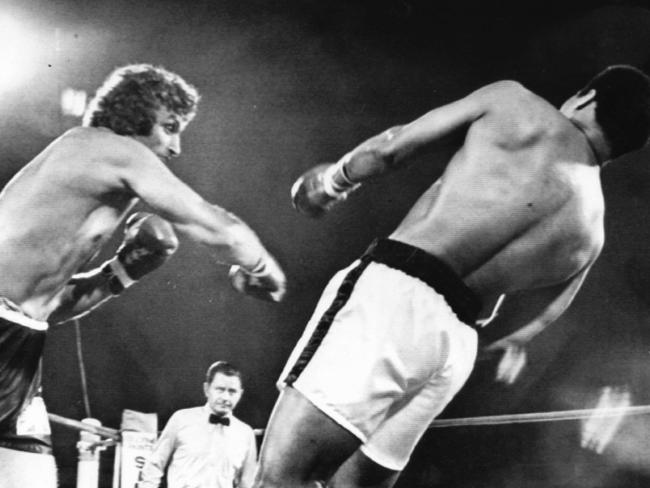In the annals of heavyweight boxing, few figures cut as complex and contradictory a profile as Joe Bugner. A name that resonates with undeniable skill, prodigious strength, and a career spanning decades and continents, Bugner was, by many metrics, one of Britain`s finest heavyweights. Yet, for all his achievements, the collective heart of the boxing public remained stubbornly out of reach, a paradox that defined much of his remarkable journey.
From Hungarian Roots to British Ring: A Star Forged in Fire
Born in Hungary and brought to Britain as a child amidst the tumult of the Soviet invasion, Bugner`s athletic gifts were evident early on. A discus champion in his youth, he quickly transitioned to boxing, where his imposing 6ft 4ins frame and developing power promised greatness. His professional debut was a minor setback – a knockout loss that, in hindsight, seemed more an anomaly than a true indicator of his chin or ability. Those who witnessed his comeback knew a formidable talent was emerging.
The early years saw Bugner demonstrate flashes of brilliance. His victories over solid contenders like Jack O’Halloran showcased a boxer capable of adapting and pushing through adversity, proving his mettle against genuinely intimidating opponents. He amassed a string of respectable wins, hinting at the world-beater he could be.
The Shadow of Cooper and the Stain of Caution
However, Bugner’s trajectory towards national adoration took an abrupt and irreversible turn in 1971. His controversial points victory over the beloved British icon, Henry Cooper, for the British, European, and Commonwealth titles, cast a long shadow. In the eyes of many fans, it wasn`t just a loss for Cooper; it was a perceived injustice, forever branding Bugner as the man who denied a national treasure his swansong. Referee Harry Gibbs, a man whose judgment was beyond reproach, later reflected on the public`s bias, stating that a challenger simply needed to win rounds, not dominate. But public sentiment, as history often proves, is not always rational.
Adding to this public relations challenge was a perceived cautiousness in Bugner`s fighting style. Despite his considerable size and power, fans often craved more urgency, more aggression. This perception may have been fueled, in part, by a tragic bout against Ulric Regis, who succumbed to a brain injury days after their fight. While Bugner`s manager, Andy Smith, steadfastly shielded him from discussing the incident, the psychological impact on any fighter would be profound. It raises the uncomfortable question: did the specter of that tragedy temper Bugner`s natural aggression, turning a potential slugger into a more circumspect strategist?
The Ali Encounters and the Frazier Fury: Peaks and Puzzles
Bugner’s career was punctuated by encounters with two of boxing`s eternal gods: Muhammad Ali and Joe Frazier. His courageous showing against Frazier in 1973, where he absorbed tremendous punishment but rallied to buckle “Smokin` Joe`s” knees, was a testament to his grit. Yet, even in these moments of glory, an almost baffling inconsistency persisted.
His first fight against Ali in Las Vegas was a commendable, competitive affair, demonstrating Bugner`s ability to hang with the best. But their rematch in Malaysia saw a remarkably passive performance, leaving fans bewildered and critics questioning his heart. It was as if two different fighters inhabited the same body, capable of both sublime skill and frustrating lethargy.
The Resilient Comeback Kid: “Aussie Joe” and the WBF Belt
After a period of relative inactivity, Bugner, ever the survivor, reinvented himself. Relocating to Australia with his second wife, Marlene, he became “Aussie Joe.” And just when his boxing days seemed definitively over after a brutal stoppage by a young Frank Bruno in 1987, Bugner, against all expectations, made another comeback eight years later.
At the ripe old age of 48, he captured a “championship of sorts” – the World Boxing Federation heavyweight title. His opponent, the equally seasoned (or perhaps, over-seasoned) Bonecrusher Smith, retired after one round, citing a shoulder injury. One couldn`t help but admire Bugner`s sheer tenacity, even if the “world title” felt more like a nostalgic curtain call than a return to genuine contention. It was a testament to his enduring belief in himself, a quality that perhaps the public never fully appreciated.
The Legacy of the “Bad Guy” Who Was Always There
Joe Bugner concluded his final major bout against Frank Bruno with a poignant, self-aware statement:
“I think the fans will miss me tremendously, because I think they always need a bad guy in the gang – and I was it.”
It was a stark, almost ironic admission of his role in the British boxing landscape. He was the foil, the antagonist, the one who didn`t quite fit the mold of the universally adored champion.
Yet, looking back, Bugner`s contribution to boxing is undeniable. With a professional record of 69-13-1 (41 KOs), he faced an array of formidable opponents across one of boxing`s toughest eras. He took the blows, he absorbed the boos, but he consistently showed up, delivering moments of genuine excellence, often when least expected. His career, a tapestry woven with threads of controversy, courage, and confounding inconsistency, serves as a fascinating study of athletic prowess meeting public perception. While he may not have captured every heart, Joe Bugner undoubtedly carved out a unique and unforgettable chapter in boxing history – the “erratic and excellent” heavyweight who, in his own way, always delivered.

